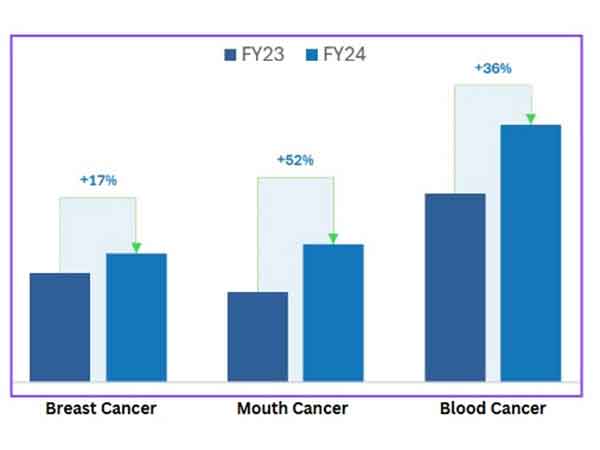Measures introduced to safeguard F&O trade a welcome step: Experts
Oct 01, 2024

New Delhi [India], October 1 : Soon after SEBI announced new measures to strengthen the index derivatives trading framework, financial market experts welcomed the move.
"The SEBI moves are on expected lines and will help in protecting the small investors from losses in the F&O segment by regulating their access and exposure," said Ajay Bagga, a veteran financial market expert.
"The curtailment of weekly options to one index per exchange will move volumes to the less volatile monthly expiries. Derivatives should be used for hedging exposures and not for pure gambling by speculators with little knowledge, training or experience in them. Overall a welcome step in protecting small investors and safeguarding market integrity," said Bagga.
The idea behind the SEBI moves was perhaps to tighten the entry barrier and raise it so that some people don't enter derivatives market.
"With lots of part timers, pass timers, get rich overnight investors coming into the markets armed with so called knowledge obtained from random groups, these people don't know the risks associated and enter the markets and end up losing money. There was rumor that ITR with certain threshold of income may be made necessary to participate in derivatives, but that cannot be the right way hence the upfront margin requirements are being raised," said Vivek Karwa of VRIDHI Investment.
As retail investors are increasingly incurring losses in equity index derivatives (F&O) trade, SEBI on Tuesday put in place as many as six measures to strengthen the derivatives framework, including raising minimum contract size.
The current stipulation is for such contracts to have a value between Rs 5 lakh and Rs 10 lakh. This limit was last set in 2015. Since then, broad market values and prices have increased by around three times.
"Given this, it has been decided that a derivative contract shall have a value not less than Rs 15 lakhs at the time of its introduction in the market," SEBI said.
Among others, SEBI reduces expiries of derivatives contract to one per exchange per week.
"Expiry day trading in index options, at a time when option premium are low, is largely speculative. Different stock exchanges offer short tenure options contracts on indices which expire on every day of the week," SEBI said explaining the rationale.
Further, SEBI asks exchanges to monitor intraday position limits for equity index derivatives, besides it has been decided to mandate collection of options premium upfront from option buyers by the Trading Member(TM)/Clearing Member(CM) from February 2025.
SEBI has also mandated additional margin requirement of 2 per cent for short options contracts on day of options expiry.
Stock Exchanges and Clearing Corporation sare directed to take necessary steps to put in place systems for implementation of measures.
Derivatives market assist in better price discovery, help improve market liquidity and allow investors to manage their risks better, but there is inherent risk attached to it.
In order to reviewtheexisting regulatory measures for investor protection while ensuring the orderly development and strengthening of equity derivatives market,as well as to identify measures to assist stock exchanges in carrying out their aforementioned core functions, SEBI formed an Expert Working Group (EWG) on derivatives,to suggest measures for investor protection and market stability.
On the basis of the measures recommended by the EWG and subsequent deliberations in the Secondary Market Advisory Committee (SMAC) of SEBI,a consultation paperwas issued by SEBI on July 30, 2024, in the matter.
The comments received were examined by SEBI,and the matter was further discussed with Stock ExchangesandClearing Corporations, before coming out with these measures.
These announced measures will be made effective in phases starting November 20.
Recently, a study conducted by the Securities and Exchange Board of India (SEBI) has revealed that approximately 93 per cent, or over 9 out of 10 individual traders in the equity futures and options (F&O) segment, continue to incur significant losses.
Despite consecutive years of losses, more than 75 per cent of loss-making traders continued trading in F&O.
The aggregate losses of individual traders exceeded Rs 1.8 lakh crore over the three-year period between 2021-22 and 2023-24, according to the study.
F&O, which stands for Futures and Options, refers to financial derivatives that allow traders to speculate on asset price movements without owning the asset itself. The underlying asset can range from stocks, bonds, commodities, and currencies to indices, exchange rates, or even interest rates.




















